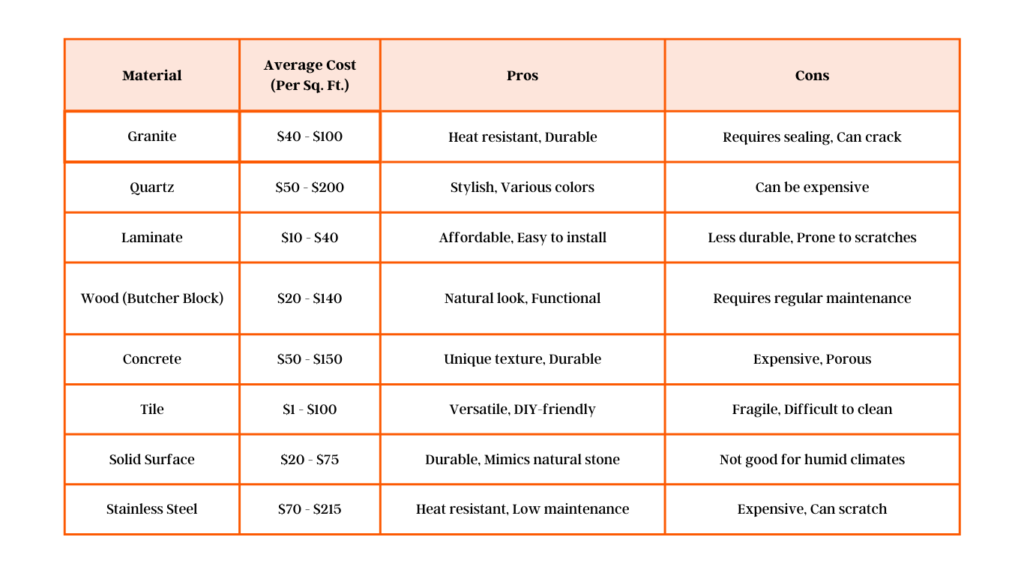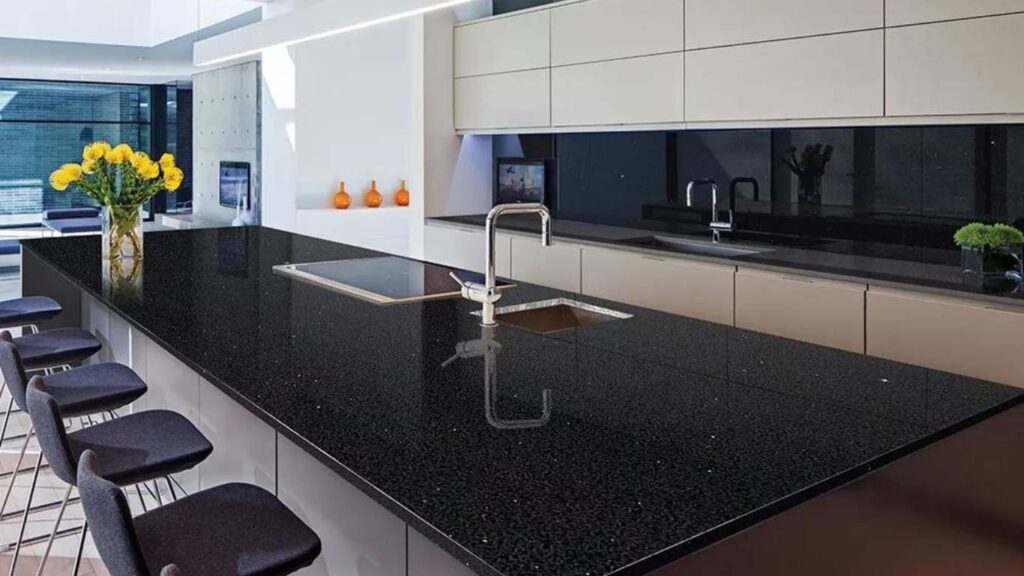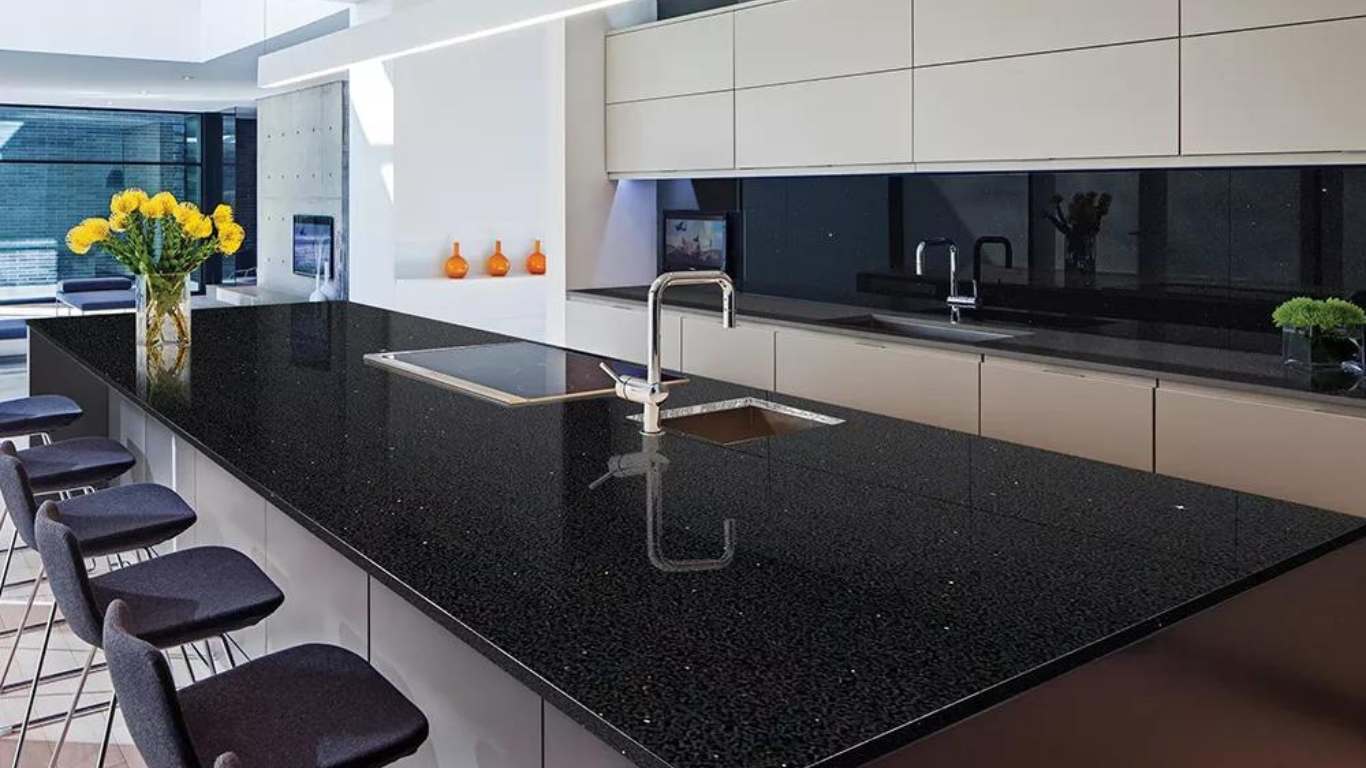Are you thinking about upgrading your kitchen or bathroom with stunning new countertops? Countertop installation can give your space a fresh, stylish look and enhance functionality. However, before diving into the project, it’s important to understand the ins and outs of countertop installation, including the costs involved, valuable tips, and finding the perfect installer near you.
Countertop Installation Costs: Labor, Materials, and More
Let’s start with the big question: How much does countertop installation cost? The total cost of installing countertops depends on several factors, including the material you choose, the size of your project, and whether you hire professionals or go the DIY route.
Factors Affecting Cost:

Countertop Material:
Countertop materials vary widely in price. Here’s a breakdown of some common options:
- Laminate: $8 to $27 per square foot
- Quartz: $15 to $70 per square foot
- Granite: $15 to $140 per square foot
- Marble: $15 to $190 per square foot
- Solid Surface/Corian: $20 to $75 per square foot
- Engineered Stone Quartz: $15 to $70 per square foot
- Natural Stone (e.g., Granite, Marble): Prices vary greatly based on rarity and quality.
Countertop Size:
Countertops are typically priced per square foot. An average kitchen might require around 55 square feet of countertops, while a luxury kitchen could need up to 75 square feet. The size of your project directly impacts the cost.
Labor Costs:
Hiring professionals for countertop installation is common. Labor costs typically range from $10 to $30 per square foot. Complex projects or premium materials may require higher labor costs.
DIY vs. Professional Installation:
DIY installation can save money on labor but is often challenging, especially for heavy materials like granite or quartz. If you choose DIY, you’ll need various tools and equipment.
Additional Factors:
Edge treatments, cutouts for sinks and cooktops, backsplash installations, and kitchen-shape layouts can add to the overall cost. Custom edges, like Ogee or Dupont, may incur additional expenses.
Calculating the Cost:
To estimate the cost of your countertop installation, follow these steps:
- Calculate Size: Measure the length and depth of your countertop area and add 4 square feet for inside corners.
- Choose Material: Select a material from the options listed above based on your preferences.
- Add Labor Costs: Multiply the size by the labor cost per square foot. For example, if your kitchen requires 55 square feet of countertops and labor costs $20 per square foot, the labor cost would be $1,100 (55 x $20).
- Consider Edge Treatment: If you choose decorative edges, add the cost per linear foot to the total. For instance, a 10-foot countertop with a $10 per linear foot edge treatment adds $100 to the total cost.
- Include Cutouts: Add the associated costs if you need cutouts for sinks or cooktops.
The Countertop Installation Process: Step by Step

Now that you understand the costs, let’s walk through the countertop installation process, whether you choose to go the professional route or take on the DIY challenge.
Step 1: Preparation
Hiring Professionals:
- When hiring countertop installers near you, inquire whether they will remove old countertops or disconnect plumbing and electrical fixtures and include these services in the project cost.
- Clear the surfaces of appliances and items you’ll need for the day.
- Create an obstruction-free pathway for installers.
DIY:
- If you’re tackling the installation yourself, gather the tools mentioned earlier.
- Disconnect plumbing and electrical fixtures if required.
- Remove all items from cabinets and clear pathways.
Step 2: Countertop Installation
Hiring Professionals:
- Typically, professionals will install countertops after flooring, cabinets, and appliances are in place.
- Custom cuts for sinks, faucets, and cooktops are made either off-site or on-site by skilled fabricators.
- Seams, if necessary, are joined with epoxy that matches the stone.
- Attachment blocks are used to secure the stone to the cabinets.
- Ensure cabinets are level and securely anchored to the wall or floor to maintain a level surface.
DIY:
- Follow manufacturer instructions and safety precautions for the chosen countertop material.
- Carefully cut and secure countertops in place.
- Pay close attention to leveling and seam joining if applicable.
Step 3: Cutouts and Sink Installation
Hiring Professionals:
- Experienced installers use computer-aided design files for precise sink and surface unit cutouts.
- Installers provide grommets for your plumber to fasten the sink.
- Some situations may require on-site cutouts, e.g., for cooktops or specialty sinks.
DIY:
- Follow manufacturer guidelines for creating cutouts.
- Carefully install sinks according to instructions.
Step 4: After Installation
- Countertop installers will reconnect fixtures and wiring as needed.
- Review care and maintenance guidelines specific to your countertop material with the lead installer.
- Take proper care of your countertops to preserve their beauty and functionality.
Quartz vs. Marble and Granite Countertop Installation
You might be wondering how the installation process differs for various countertop materials. Let’s briefly explore the installation nuances for quartz, marble, and granite.
Installing Quartz Kitchen or Bathroom Countertops:
- Quartz slabs are engineered and typically come in uniform sizes, reducing the need for aligning and sealing seams.
- Quartz is nonporous, eliminating the need for sealing or waxing against stains and mildew.
- Consult your installer for cleaning and maintenance best practices.
Installing Marble or Granite Kitchen and Bathroom Countertops:
- Natural stone countertops are heavy and often require multiple sections seamed together during installation.
- Sealing is recommended upon installation to prevent stains and etching. Annual resealing may be necessary.
- Proper care instructions are crucial to maintain the stone’s beauty and durability.
Finding the Right Countertop Installer Near You

Choosing the right countertop installer is vital for a successful project. Here are some tips for finding a reliable professional:
- Always ask for recommendations from people in your close circle, friends, family, or neighbors who have recently had countertop installations.
- Check online reviews and ratings of local countertop installers.
- Request quotes from multiple installers to compare costs and services.
- Verify the installer’s license and insurance to ensure they meet local regulations and have liability coverage.
- Ask for references and examples of past work to assess their craftsmanship.
- Use trusted countertops database: Countertops near me.
10 Most Frequently Asked Questions About Countertop Installation
Countertop installation can be an exciting home improvement project, but it often raises several questions for homeowners. Here are the most frequently asked questions about countertop installation and precise answers.
1. What Is the Labor Cost to Install Countertops?
The labor cost to install countertops can vary based on material, project size, and location. On average, professional installation ranges from $10 to $30 per square foot. Remember that premium materials and complex projects may incur higher labor costs. While installing countertops yourself is possible, it’s not recommended unless you have experience, as it can be challenging.
2. Can You Install Countertops Yourself?
Yes, installing countertops yourself is possible, but it’s not a simple DIY project. The complexity varies depending on the material. Installing post-form countertops, like laminate, is one of the easier options. If you choose to go the DIY route, ensure that your cabinets are level and the old countertop and sink have been removed. Follow manufacturer instructions and safety precautions carefully.
3. How Long Does It Take Professionals to Install Countertops?
The duration of countertop installation depends on factors such as the project’s size and complexity. Here’s a rough estimate:
- Smaller and simpler kitchens: 2 to 3 hours. Countertop fabrication software and technology shortened the process.
- Average-sized kitchens (around 60 square feet of counter space): About 4 hours.
- Large and complex kitchens: 6 to 7 hours.
4. What Is the Cheapest Way to Do Countertops?
Consider ceramic or porcelain tile if you’re looking for budget-friendly countertop options. These materials are among the cheapest and offer various colors and patterns. They look like more expensive stones. Natural stone tiles are usually pricier than ceramic but still more affordable than full slab countertops.
5. Do Countertops Sit Directly on Cabinets?
Yes, countertops typically sit directly on cabinets. Whether in new construction or remodeling, countertops are usually installed after the flooring, cabinets, and appliances are in place. Cabinets must be properly installed and securely anchored to the wall or floor to ensure a level surface for your countertops.
6. What’s the Easiest Countertop Material to Install?
Laminate countertops are often considered the easiest to install. They are cost-effective and come with straightforward installation procedures. Thanks to advancements in printing technology, laminate countertops now offer attractive designs and durable finishes. However, avoiding cutting directly on laminate surfaces is essential to prevent damage.
7. Do Countertops Increase Home Value?
Yes, upgrading your countertops can positively impact your home’s value. Granite and quartz countertops, in particular, provide a good return on investment. These materials are highly desirable for their durability, aesthetics, and low maintenance. When potential buyers see upgraded countertops, it can make your home more appealing and potentially lead to a higher resale value.
8. Can I Install a New Countertop Over My Existing One?
Sometimes, you can install a new countertop over an existing one. This process, known as countertop overlay or resurfacing, is commonly done with materials like quartz or granite overlays. However, ensuring that your existing countertop is in good condition and securely attached to the cabinets is essential. The existing surface should be thoroughly cleaned and prepared before the overlay is installed.
9. How Do I Choose the Right Countertop Material?
Selecting the right countertop material depends on your needs, budget, and style preferences. Here’s a brief overview:
Granite: Offers a luxurious look and excellent durability but may require periodic sealing.
Quartz: Requires minimal maintenance, is highly durable, and comes in various colors and patterns.
Marble: Marble is a more elegant stone but also easy to stain and requires regular care.
Laminate: Affordable and easy to maintain but less durable than natural stone.
Tile: Offers versatility and affordability with various design options.
10. Should I Hire a Professional for Countertop Installation?
While some homeowners choose to install countertops themselves, hiring a professional is often recommended, especially for materials like granite, quartz, or marble. Professionals have the expertise and tools needed to ensure precise measurements, a secure fit, and seamless seams. DIY installation is usually challenging and may lead to costly mistakes if not done correctly.
Countertop Installation- Conclusion
In conclusion, investing in countertop installation is a fantastic way to transform your living space and add value to your home. You can build your dream kitchen or bathroom by considering the factors that affect costs, following the installation steps, and finding the right installer. If you have more questions or need assistance, don’t hesitate to reach out to countertop experts and professionals in your area. Happy countertop upgrading!
